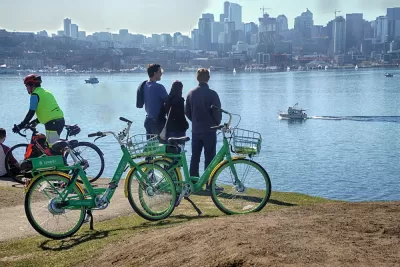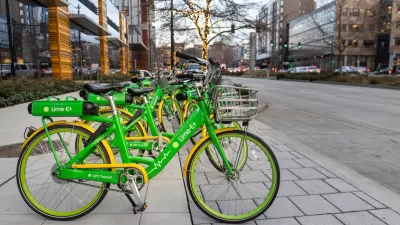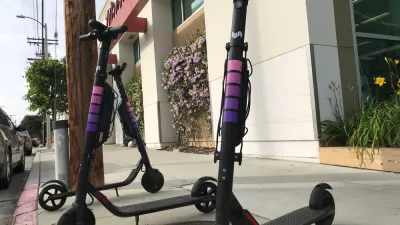Proposals before the city council include a per-vehicle tax on shared bikes and scooters and a hike to the city’s vehicle registration fee.

Seattle’s city council will weigh proposed amendments to the city budget that would raise the city’s vehicle licensing fee, double the number of speed cameras in school zones, and impose a $0.25 per-vehicle fee for shared mobility operators, among other items. Writing in The Urbanist, Ryan Packer explains that the city wants to find new sources of revenue to fund transportation and mobility projects.
Packer questions whether adding a fee to bike and scooter travel would discourage their use when the cost of an average scooter trip is already more than twice as much as a bus trip. “City council central staff thinks, based on 2022 usage info, that the tax would generate $716,000 per year, revenue that would only come in after the city spends an estimated $540,000 to implement the fee. After that, the funds are specifically restricted to protected bike lanes, traffic calming, and other vision zero projects.”
Packer points out that “Whether free-floating bike and scooter share programs are even here to stay is far from a sure thing, with the city now on its third or fourth iteration of rental companies who have deployed vehicles on the city’s streets.”
Packer outlines a list of transportation projects proposed by city councilmembers, such as pedestrian safety improvements, street trees, traffic calming, and bike lane barriers.
FULL STORY: Seattle City Council Floats Car Tab Increase, New Bikeshare Tax During Budget Discussions

Alabama: Trump Terminates Settlements for Black Communities Harmed By Raw Sewage
Trump deemed the landmark civil rights agreement “illegal DEI and environmental justice policy.”

Planetizen Federal Action Tracker
A weekly monitor of how Trump’s orders and actions are impacting planners and planning in America.

How Atlanta Built 7,000 Housing Units in 3 Years
The city’s comprehensive, neighborhood-focused housing strategy focuses on identifying properties and land that can be repurposed for housing and encouraging development in underserved neighborhoods.

In Both Crashes and Crime, Public Transportation is Far Safer than Driving
Contrary to popular assumptions, public transportation has far lower crash and crime rates than automobile travel. For safer communities, improve and encourage transit travel.

Report: Zoning Reforms Should Complement Nashville’s Ambitious Transit Plan
Without reform, restrictive zoning codes will limit the impact of the city’s planned transit expansion and could exclude some of the residents who depend on transit the most.

Judge Orders Release of Frozen IRA, IIJA Funding
The decision is a victory for environmental groups who charged that freezing funds for critical infrastructure and disaster response programs caused “real and irreparable harm” to communities.
Urban Design for Planners 1: Software Tools
This six-course series explores essential urban design concepts using open source software and equips planners with the tools they need to participate fully in the urban design process.
Planning for Universal Design
Learn the tools for implementing Universal Design in planning regulations.
Jessamine County Fiscal Court
Caltrans
Institute for Housing and Urban Development Studies (IHS)
City of Grandview
Harvard GSD Executive Education
Toledo-Lucas County Plan Commissions
Salt Lake City
NYU Wagner Graduate School of Public Service





























